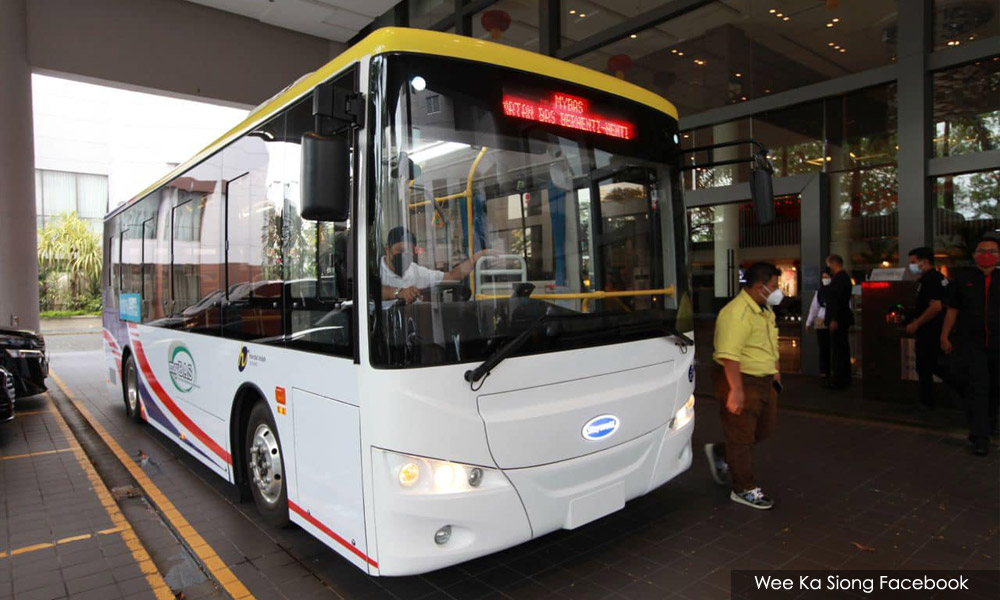Since March 2022, buses with the myBAS livery have plied the streets of Johor Bahru.
Even though the federal government-funded initiative first made its debut in 2015, until recently, MyBas was only present in towns with a relatively small population, such as Kangar, Seremban, Ipoh and Kuala Terengganu. By expanding the service into Johor Bahru, which has about 1.5 million inhabitants, myBAS could potentially serve a much larger population catchment compared to previous years.
It would be useful first to understand how the new financing model for myBAS is intended to improve bus service standards before evaluating its effectiveness.
Under the conventional financing model, privately-run bus companies are dependent on farebox revenue for income. Even though bus ridership figures are unavailable for Johor Bahru, public transport as a share of overall motorised trips is only 20 percent in Klang Valley – which has Malaysia’s most utilised and developed public transportation.
Ridership figures for Johor Bahru are, therefore, expected to be significantly lower. Low ridership and farebox revenue discourage bus operators from continuing their operations, with profit margins possibly negligible or even in the red.
The Transport Ministry has recognised that public transport is essential to the rakyat’s welfare since private transport is typically less affordable in spite of generous petrol subsidies. In addition, certain societal segments remain reliant on public transport for their mobility needs.
Given the diverging interests between bus operators and the broader social welfare, the Transport Ministry implemented the Stage Bus Service Transformation (SBST) in 2015 – under the product name myBAS. The Transport Ministry would pay bus companies for operating routes at predetermined frequencies. Farebox revenue collected by myBAS would instead be channelled back to the Transport Ministry.
With the Transport Ministry assuming the financial risk of bus operations, including potentially loss-making routes, public transport standards in terms of routes served and frequencies are expected to improve.

MyBAS Johor Bahru is expected to cost RM50 million each year, and the Transport Ministry has allocated RM150 million to fund the first three years of operations.
Nonetheless, it is unlikely that the new financing framework under myBAS could alone radically improve Johor Bahru public transport standards. Its routes seem to have mirrored existing routes, which private operators formerly ran, with few (if any) new routes launched to cover under-served areas.
Additionally, the wait times can be up to 90 minutes for myBAS during off-peak hours, which further dampens the attractiveness of bus usage. Nonetheless, myBAS did deliver some improvements. Based on anecdotal reports, myBAS is largely punctual and adhered to the published frequencies.
Service duplication
Given the scarce government resources available – at both federal and Johor state levels – to subsidise public transport in Johor Bahru, it would be prudent and resource-efficient to combine the government schemes and transport agencies under one roof.
At present, there is overlapping governance for public transport in Johor Bahru. Apart from the federal-funded myBAS in Johor Bahru, the Johor state government has implemented the fare-free Bas Muafakat across Johor – including Johor Bahru – since 2016 at an annual cost of RM30 million.
Unlike myBAS, Bas Muafakat routes do not collect fares from passengers. The annual ridership for Bas Muafakat across Johor prior to the outbreak of Covid-19 was close to two million.
Bas Muafakat is managed by the Public Transport Corporation of Johor, an entity which reports to the Johor state government rather than the Transport Ministry.
The presence of two transport schemes and government agencies for Johor Bahru public transport may result in duplication and wastage of public resources in terms of route planning, monitoring and performance evaluation.
The waiting time for both Bas Muafakat and myBAS is relatively long. Even though Bas Muafakat generally does not overlap with myBAS routes, the simultaneous presence of fare-free and paid services within Johor Bahru is likely to result in some degree of cannibalisation where passengers utilise fare-free services even if the latter is less convenient or more time-consuming.
Perhaps Johor Bahru may reference London, where one transport agency (Transport for London or TfL) is responsible for most of London’s public transport. The consolidation could result in greater efficiency of public resources, with savings channelled to fund more bus routes and frequencies, thereby increasing the appeal of public transport in Johor Bahru. - Mkini
KEVIN ZHANG is senior research officer at the ISEAS-Yusof Ishak Institute.
The views expressed here are those of the author/contributor and do not necessarily represent the views of MMKtT.



No comments:
Post a Comment
Note: Only a member of this blog may post a comment.